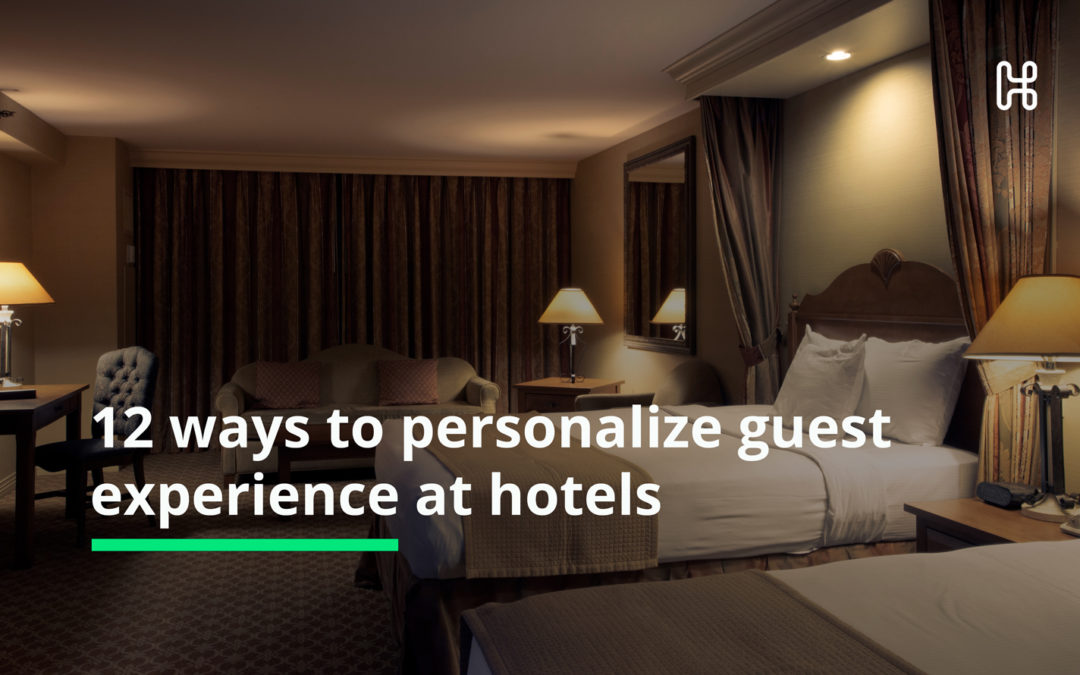Drive-thru menus at fast food chains make suggestions based on your order, the weather and location, while online fashion retailers are creating virtual fitting rooms with unique avatars for each customer. As personalization seeps into every aspect of life, guests expect similar experiences from hotels. In fact, Oracle and Skift surveyed 5,600 hotel guests and discovered that 74% hoped hotels would use AI to tailor everything from pricing to F&B menus.
So, how can your hotel keep pace with guest expectations? Digital hospitality platforms like Hudini harness AI and data to deliver the 3Cs – comfort, control and convenience – to hotel guests, while generating insightful data about individual preferences. Hotels can apply data through predictive analytics to create unique experiences for each guest; think rooms with the perfect view, minibars stocked with their favorite beverage, and sightseeing recommendations matching their interests.
Technology allows for personalization at every step of the guest journey. Here are 12 touchpoints that hotels can leverage to make stays more unique.
1. Booking
Data-based guest profiles enable hotels to target potential customers with more relevant packages. For example, a family planning a holiday will be more attracted by hotels offering special rates and activities for kids. This also boosts direct bookings. Additionally, app and website-based bookings let guests choose the room type and location, and make special requests.
Based on the information collected during the booking process, hotels can suggest specific upgrades, such as a dinner at the chef’s table for a couple or add-ons at the business center for executives.
2. Ambience & amenities
Smart room controls allow guests to set the room’s temperature and lighting, choose the firmness of their pillows and type of bed linen, and even sync alarm clocks to sleep trackers.
3. F&B
Menus can now be tailored with the tap of a button, showing F&B options that match each guest’s dietary preference. Digital menus can also suggest add-ons for every order and push special rates on dining packages.
4. Housekeeping
Guests can now schedule housekeeping services at their convenience, or make the eco-friendly choice of declining or reducing room cleaning. They have more control over the replacement of towels and toiletries, as well as selecting the contents of the minibar.
5. Digital concierge
The app-based digital concierge can handle reservations, in-room dining orders, housekeeping requests, itinerary planning and translation for guests, creating the impression that they have their own personal assistant during the stay.
6. 24×7 customer support
The chatbots in hotel apps can engage with guests in real time, answering queries, making reservations and offering reminders. Additionally, chatbots can converse in the guest’s language of choice, making communication more comfortable and seamless.
7. In-room entertainment
Guests can connect the room’s entertainment system to their mobile device and directly stream content from their personal OTT accounts. The Hudini app, for example, offers screencasting and voice command features with which guests can easily enjoy their favorite content in their hotel rooms.
8. Health & fitness
Hotels are now bringing wellness into guest rooms. For instance, Hudini recently collaborated with Three Sages, a leading wellness technology platform, to offer curated wellness content on the in-room TV. Guests can incorporate Three Sages’ nature-inspired practices of yoga, stretching, breath-work and more into their own fitness routines.
9. Recommendations
From special requests made while booking to in-room dining orders, guests make their preferences known through every interaction with the hotel. This data can be used to personalize every recommendation made to guests, from spa packages and food festivals at restaurants to must-visit tourist destinations in the hotel’s vicinity.
10. Offers & loyalty benefits
The data generated by hospitality apps helps build better guest profiles, providing information about everything from dietary needs to recreational preferences. With these details, hotels can customize packages and offers for each guest, thereby increasing the chances of conversion and revenue generation.
11. Digital payments
Digitalization has opened up a host of payment avenues, giving guests more options for clearing their hotel bills. In addition to cash and card payments, they can now opt to make contactless payments through their mobile phones as well. With the Hudini app, guests can preview their bills prior to departure, pay them online and enjoy a faster, seamless check-out.
12. Feedback
Notifications on the hotel app prompt guests to offer their opinions on the stay and service, making the feedback process more immediate and actionable. Hotels can use this information to further understand a guest’s preferences to curate bespoke services and offers.
A PwC study found that guests are willing to spend an additional 14% on excellent customer experience at hotels, which is being increasingly linked to personalization. Personalization is the future, not just a passing trend. Hotels that master it while ensuring data security and privacy will differentiate their brand, attract more guests and see an uptick in revenue.
